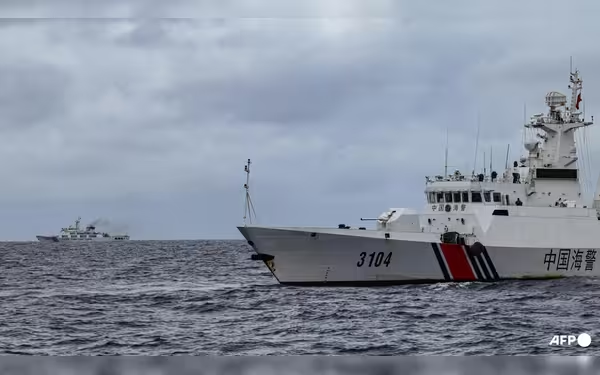Saturday, November 16, 2024 05:52 PM
Philippines Vows Continued Presence at Sabina Shoal Amid Tensions
- Philippine Coast Guard to maintain presence at Sabina Shoal.
- Deployment aims to monitor China's reclamation activities.
- Philippines asserts rights despite external pressures.
 Image Credits: channelnewsasia
Image Credits: channelnewsasiaPhilippines Coast Guard confirms ongoing vessel deployment at Sabina Shoal to assert rights amid China's territorial claims.
The South China Sea has long been a region of tension and territorial disputes, particularly between China and several Southeast Asian nations, including the Philippines. One of the focal points of this contention is the Sabina Shoal, a small landform that lies within the Philippines' exclusive economic zone but is also claimed by China. The situation escalated recently when the Philippine Coast Guard (PCG) announced its commitment to maintain a presence in these contested waters.
On September 16, the PCG confirmed that it would continue to deploy vessels to the Sabina Shoal, following the return of its ship, the Teresa Magbanua, after a five-month mission. This deployment was primarily aimed at monitoring what the Philippines suspects to be China's ongoing land reclamation activities in the area. PCG Spokesperson Jay Tarriela emphasized the importance of maintaining a consistent presence, stating, "We will sustain presence over these waters." This statement underscores the Philippines' determination to assert its rights in the face of China's expansive claims.
Tarriela clarified that the return of the Teresa Magbanua was not a response to China's demands for withdrawal but was necessary for repairs and to address the crew's medical needs. This distinction is crucial, as it highlights the Philippines' resolve to operate independently in its own waters, despite external pressures.
Sabina Shoal, known as Xianbin Reef by China, is strategically located west of the Philippine province of Palawan. The shoal is not just a point of contention; it represents the broader struggle for control over vital maritime resources in the South China Sea. China's coast guard has also stated its intention to continue law enforcement activities in these waters, reinforcing its claims over the area.
China's assertion of sovereignty over most of the South China Sea has been a source of international concern, particularly since the Hague arbitration tribunal ruled in 2016 that China's expansive claims were without legal basis. However, Beijing has consistently rejected this ruling, further complicating the situation.
As the Philippines continues to assert its rights in the South China Sea, the situation remains delicate. The commitment to deploy vessels to the Sabina Shoal reflects a broader strategy to safeguard national interests and uphold international law. For the Philippines, this is not just about territorial integrity; it is about ensuring that its voice is heard in a region where power dynamics are constantly shifting. The ongoing developments in the South China Sea will undoubtedly continue to attract global attention, as nations watch closely how this maritime dispute unfolds.













